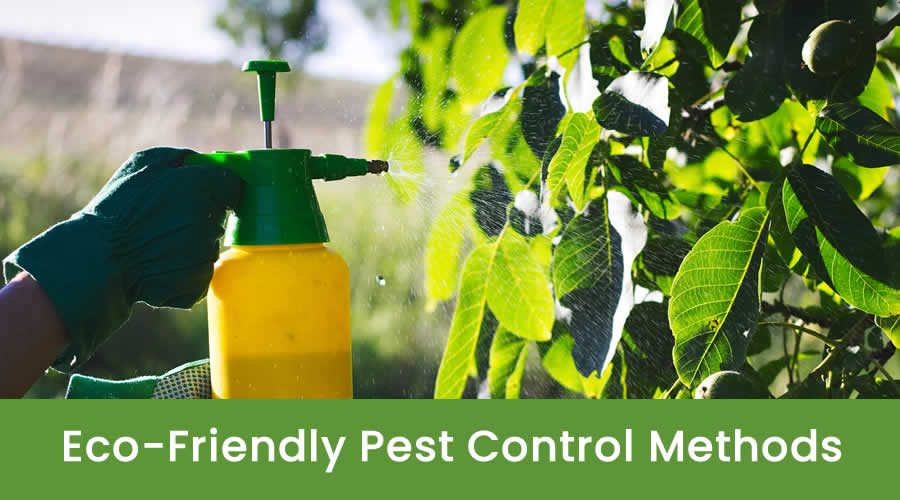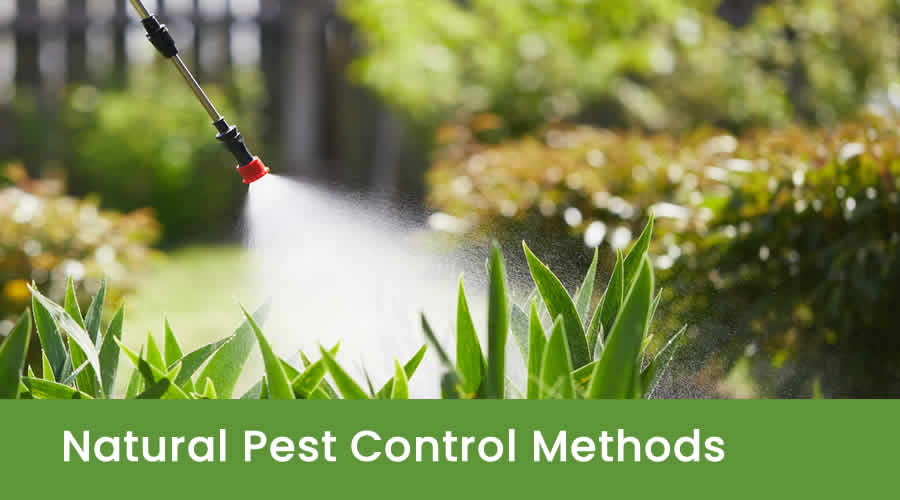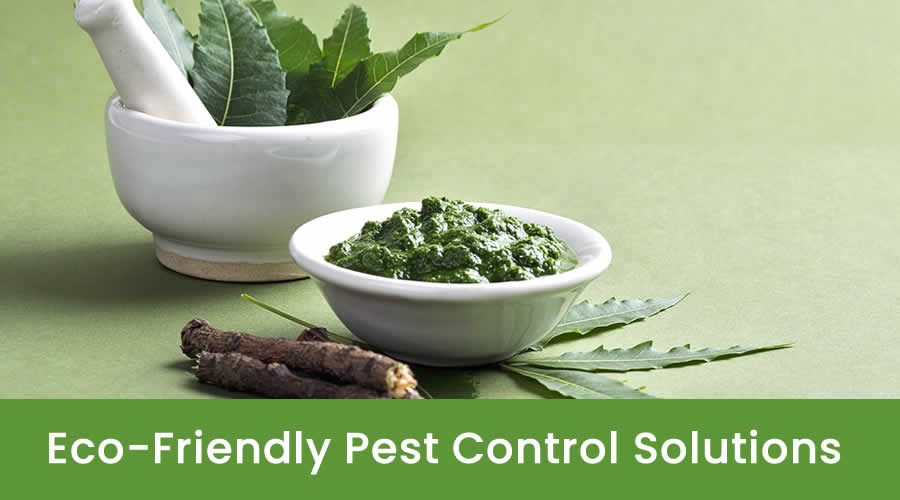Eco-Friendly Pest Control Methods
Natural and Sustainable Solutions

Found bugs on your garden plants or in your residential or commercial properties? You can treat pests without harsh chemicals or use of pesticides. Learn some eco-friendly pest control methods that are safe for your family, and the planet in this article!
Why Go Green with Pest Control?
Using natural pest control methods helps protect our environment and aids in the preservation of ecosystems, reducing the risk of exposing humans, especially children, to harmful pesticides that might cause harm to beneficial insect populations. It keeps harmful chemicals out of our soil, water, and air. Plus, it’s safer for pets, kids, and all the helpful species in our gardens.
Natural Ingredients to Keep Pests Away
Here are 15 natural ingredients you can use in your organic pest control approach:
1. Neem Oil
Neem oil comes from the neem tree. It’s an environmentally friendly insecticide use to get rid of pests such as aphids and mites without causing harm to your plants. Unlike some traditional pest control or chemical pesticides, neem oil does not lead to pest resistance.
2. Diatomaceous Earth
Made from tiny fossilized algae. Sprinkle diatomaceous earth around areas where you see insects. It helps control a range of pests such as ants, fleas, cockroaches, and silverfish.
3. Garlic Spray
Blend some garlic cloves with water, strain it, and spray the mixture where needed. It’s a simple natural pest control treatment that can help protect your house.
4. Chrysanthemum Tea
Boil chrysanthemum flowers to make a tea. Once it cools, use it to spray on plants. It has a natural chemical called pyrethrum, that kill bugs. It provide benefits without synthetic pest control products.
5. Soap Spray
This simple, non-toxic spray help eliminate insects like aphids, controlling pests with less impact on the ecosystem.
6. Baking Soda
Mix it with water and a bit of soap to make a spray. Applying this eco-friendly solution is a simple process and one of the effective natural treatment options to maintain plant health.
7. Eucalyptus Oil
Repels mosquitoes and flies. Dab some on cotton balls and place them around your homes to avoid pests.
8. Citrus Peels
Don’t throw away orange or lemon peels! Place them near entry points and cracks to deter pests such as ants and other bugs, a simple prevention technique for homeowners.
9. Vinegar
Keeps spiders and ants at bay. Mix it and water solution to protect your property without harmful effects or damage.
10. Hot Pepper Spray
Blend hot peppers with water to make a spicy spray. This solution can deter squirrels, birds, and other animals, including small mammals, from nibbling on plants, keeping your food sources safe.
11. Essential Oils
Use these as natural repellents in sprays or diffusers to keep pests away from your habitat.
12. Coffee Grounds
Sprinkle used coffee grounds in your garden. They can naturally repel slugs and snails.
13. Salt
A line of salt can stop ants from entering your home, preventing pest issues. They won’t cross over it!
14. Cornmeal
Sprinkle corn meal where you see ant trails. This is an effective way of eliminating ants.
15. Beer Traps
Fill a shallow dish with beer and place it in your garden. Slugs and snails are attracted to it and will leave your plants alone, reducing harm from these pesky organisms. This is a common and easy method to protect your plants.

Physical Control Methods
Sometimes, the best natural way to deal with pest problems is by using physical pest control methods. These are simple actions you can take without any sprays or chemicals.
- Hand-Picking: See a bug on your plant? Gently pick it off and safely relocate it.
- Barriers: Use nets or row covers to protect plants from insects.
- Traps: Set up traps for pests like rodents, such as rats, or insects. For example, sticky traps can catch flying insects, and bait traps can help control termites.
- Water Spray: A strong spray of water can knock pests off your plants. This method involves spraying water to remove pests.
Biological Controls: Meet the Beneficial Insects
Not all bugs are bad! Some are actually super helpful. Using biological pest control method means introducing these beneficial insects, which act as natural predators, to your garden.
Some examples of helpful species:
- Ladybugs: They love to eat aphids and mites, providing natural pest control services.
- Praying Mantises: They eat a variety of pests, reducing the need for chemical insecticides.
- Lacewings: Their larvae target lots of soft-bodied insects, benefiting your garden’s health by reducing common pests.
You can attract these insects and other beneficial wildlife by planting flowers.
Combining Methods for the Best Results
Using a mix of these techniques can give you the best and eco-friendly pest control solutions. This is called Integrated Pest Management (IPM), an approach that combines different strategies to keep pest infestation under control while minimising damage, disruption, and harm to the environment and protecting the safety of people and children.
This process offers multiple options and can enhance your pest removal experience.
Quick Tips:
- Keep your garden clean and remove dead plants.
- Rotate crops to prevent pests from settling in.
- Plant pest-repelling plants like marigolds and basil, among others.
Remember, pests might still find their way in, but these methods often work.
Handy Table: Natural Repellents
| Natural Ingredient | Pests Controlled |
|---|---|
| Neem Oil | Aphids, mites |
| Diatomaceous Earth | Ants, fleas, cockroaches, silverfish |
| Garlic Spray | Insects, rabbits, parasites |
| Chrysanthemum Tea | Insects, caterpillars, wasps |
| Soap Spray | Aphids, mealybugs |
| Baking Soda | Fungal diseases |
| Eucalyptus Oil | Mosquitoes, flies |
| Citrus Peels | Ants, mosquitoes |
| Vinegar | Spiders, ants |
| Hot Pepper Spray | Insects, squirrels |
| Essential Oils | Various insects |
| Coffee Grounds | Slugs, snails |
| Salt | Ants |
| Cornmeal | Ants |
| Beer Traps | Slugs, snails |
Conclusion
Going with green pest control is not only highly effective but also rewarding. You get to protect your home and garden plants, enjoy a healthy area, and help the environment all at once. Next time you spot a pesky bug, remember these eco-friendly methods and control treatments. They don’t harm beneficial insects like bees. Does eco-friendly pest control treatments really work? Yes, it does! Your garden will thank you, and so will Mother Earth!
This blog post was written by Adam Carr from Eco Pest Control Perth, a leading pest control company in Australia.
If you want to ask questions or know more information, you can call us now.
We offer environmentally responsible services to control pest infestations, such as cockroach pest control, spider pest removal, mice pest control, residential pest control, commercial pest control, and end of lease treatment as well.
Contact us today.
Our Reliable Resources:
https://www.homesandgardens.com/gardens/natural-pest-control-methods



